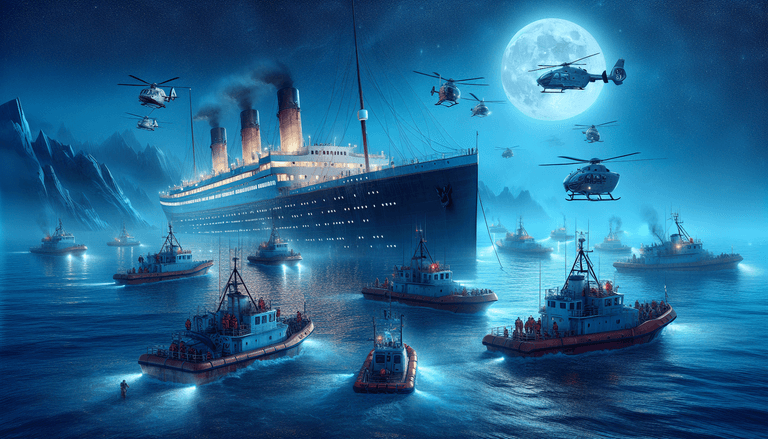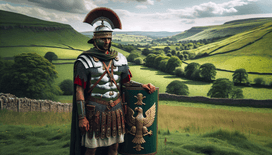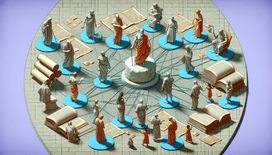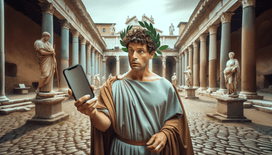Ahoy there, landlubbers and history boffins! Gather 'round as we set sail on a whimsical voyage through history with a jaunty twist of modern technology: GPS. Yes, that little sat-nav voice guiding you past the local chippy could have been quite the game changer if only it had graced the Titanic's bridge back in 1912.
The Titanic Sets Sail: A Timely Tune-Up
Picture this: It's April 10, 1912, and the RMS Titanic is ready for her maiden voyage. She's the jewel in the crown of maritime engineering, unsinkable, they said. But what if Captain Edward Smith and his crew had a secret weapon alongside their sextants and nautical charts? Enter GPS!
Armed with a Global Positioning System, our intrepid captain would have tapped into a treasure trove of satellite signals, shrinking those vast, icy Atlantic waters into a mundane game of 'avoid the big floating thingies.' Instead of navigating by the stars, Captain Smith could simply have typed in "New York, USA," and let the 20th-century equivalent of Google Maps do the rest.
Iceberg Warnings in Real Time
Now, we're all familiar with the unfortunate twirl the Titanic did around an unscheduled icy visitor, an iceberg so infamous, it could start its own Twitter account. But what if Captain Smith's personal GPS had been polite enough to chime in with a gentle "Iceberg dead ahead! Take a sharp left, mate!"
The Titanic's story could have been different. Imagine the ship charting a path that dodged these glacial menaces like a careful dancer weaving through a crowded ballroom.
Real-Time Location Sharing – "Check-in From Disaster."
In today’s world, we're all chronic over-sharers of location (“At the gym sweating like a haddock!” or “At the pub, again?”). Imagine if Titanic’s passengers had their own dose of FOMO (Fear of Missing Out) in 1912. With GPS in their pockets, passengers could broadcast their location to envious relatives left on European shores. "On the Titanic, #LivingMyBestLife!" Until, of course, someone’s father-in-law commented, "You missed an iceberg while posting about caviar, didn’t you?"
The world might have known about that iceberg encounter in real time. And perhaps, just perhaps, when the unsinkable ship began to test the veracity of that claim, nearby ships could have navigated to aid the great liner.
Rescue Relocated
On that fateful night, the RMS Californian, a mere beacon of hope stranded a few nautical miles away, could only offer helpless witness from afar. But with GPS connecting all manner of shipping traffic, a distress signal, perhaps in the form of a cheeky text: "RIP Titanic. SOS!", could have rallied not only the Californian but any sea vessel within a 100-mile radius.
The wireless telegrams may have been slow, but a rapid GPS ping could have sent a veritable flotilla to rescue passengers, sparing us decades of film historians nit-picking the appropriate spot for a wooden door floating in the North Atlantic.
GPS Gone Overboard?
Of course, one must consider if GPS could have gone the way of auto-correct on a befuddled smartphone user, inadvertently rerouting the Titanic to some distant, off-the-chart land. "Recalculating... next right-turn, Iceland!" Ah, the humanity of technology, ever fallible!
Yet, in this parallel universe, the Titanic might reside not at the bottom of the ocean, but instead in the annals of history as "that time we slightly scuffed the ship but made it home safely." The history books could have been filled with tales of nautical camaraderie and clever seamanship.
Conclusion: A Titanic Missed Opportunity?
Ultimately, the thought of combining one of the most tragic maritime disasters with a sprinkling of modern navigational panache leaves us with one fundamental reflection. Would Captain Smith trade the skill of his seasoned mariners for algorithms and circuitry? Probably not entirely, but a mix could have turned a disaster into a merry nautical romp and potentially changed history’s course.
So, dear readers, as you navigate the ebbs and flows of your daily life with that trusty GPS companion at the helm, spare a thought for the Titanic and Captain Smith. They may have missed out on satellite technology, but with a turn of imagination, we can navigate the exhilarating waves of what might have been!







